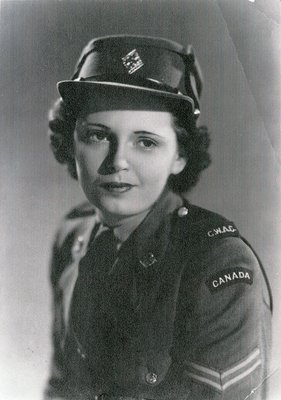Sergeant
Evelyn Jamieson


My
name was Evelyn Jamieson. I was born on a farm north of Cobourg,
Ontario, and attended high school in Port Hope. I was working at Goodyear Tire,
New Toronto, in the advertising department when I decided to join the CWAC. My
family doesn’t have a military background but I did have a brother. I thought
he might not enlist and stay on the farm but that didn’t happen and he joined
the air force. Luckily, he survived the war.
Very
likely, my main reason for joining were posters asking women to join the forces
to relieve soldiers for active duty. I was 20 years old when I enlisted in
Toronto on March the 14th, 1943, as W21244. Trinity Barracks, also known as
“cockroach palace”, was the staging area. The recruits had the normal medical
checkups, IQ tests, etc.
Basic
training was in Kitchener, Ontario. Nothing unusual about that but it was a
little difficult getting used to 70 girls in a barracks, one big room in April
in a building with just two stoves, one at each end of the room. The girls had
to look after the stoves and most of them were from towns and cities and didn’t
know how to stoke a fire. We coped, made friends and graduated.
After
graduation, we returned to Trinity Barracks to be posted. While waiting, there
was a Victory Bond drive being held in Canada. For several days in early
evening, we were taken by streetcar to different parts of Toronto for a parade.
All three services were there with bands for navy, army and air force. It was
in May and I remember the girls singing wartime songs as we rode along on the
streetcar with windows wide open. That duty was much more fun than washing
dishes at the barracks.
Early
in June, I think about the 1st, about 15 or 20 CWAC were posted to Orillia and
traveled by train. I became a stenographer at headquarters company at [No.] 26
Canadian Army Basic Training Centre. And there were four companies, so there
would have been approximately 600 soldiers and staff. Later in the year, I went
over to work at C company. A very vivid memory I have is of working as a draft
marched out of camp, including the men we replaced. I know some of them did not
return home.
It
was a wonderful posting and two of us, Dot Newton and I, went into the town and
played softball for a local team, Bryson’s Bread. And also went down to the
exhibition grounds in Toronto to run at a field day. When I joined, I had
requested taking a wireless radio course and in March 1944, I was sent to
Barriefield, Kingston. Many of the girls taking the course wanted to go
overseas but I didn’t. Many had relatives overseas and wanted adventure.
I
knew quite a lot about Morse code and radio before joining and being young and
foolish, I wanted to return to Orillia and requested a transfer. It was granted
and I returned to Trinity Barracks in Toronto, expecting to return to Orillia
and evidently, they were also expecting me. About that time, the training of
agents at Camp X, a spy training school and communication centre, ceased
operation at the end of April or early May and became entirely communications.
I was sent down to an office at Yonge and King Street and interviewed by a
Major Justin. A few days later, June the 1st, 1944, three CWAC were picked up
by an army vehicle and driven out of Toronto to Camp X. Our first view was a
group of buildings surrounded by a fence and guards on the gates.
I
can’t remember whether we were told in Toronto that we would be under the
Official Secrets Act or when we arrived in camp. Civilian men and women and
army men and women worked together. There were several CWAC at camp before we
arrived, a driver and kitchen staff. But we were the first CWAC to work on
communications.
My
first job was on a teleprinter as a teletypist. Later, I worked on a
Kleinschmidt machine, rather like a clunky typewriter with tape. I spent most
of my time working on the Boehme tape puller or undulator . We were sending and
receiving traffic to England and to New York and Washington. It was many years
after the war, we learned we were sending to Bletchley Park. All traffic was in
five letter groups and plain English was never used. My knowledge of Morse code
was important.
We
worked 365 days a year, 24 hours a day and there were several shifts, 8 to 4, 4
to 12, 12 to 8 and a couple of swing shifts. I worked happily beside civilians,
doing the same work. Our pay was different but I can’t remember that being a
problem. I have heard since that there was some dissatisfaction. We had bus and
train service from Oshawa. The secrecy was kept. My family did not know where I
was or what I was doing until after the war. We had a phone number of a Bell
telephone supervisor in Oshawa which we could call and they would contact the
camp. I used it for some reason, likely a mix up in times when I should be
picked up.
At
the end of the war I went, I think, to Long Branch for discharge. I was
discharged on October 24, 1945 as a Sgt. with 'B' trades pay in 'Keyboard' and
'F.W.S.' As a civilian I returned to Camp X and carried on with work as before.
I did so until my marriage in July 1946.
Additional Information
Additional Information
No comments:
Post a Comment